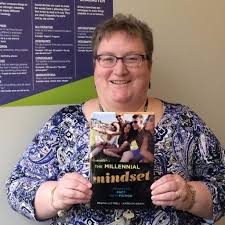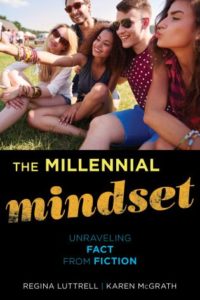Communications Professor Becomes Expert on Millennial Behavior
August 3, 2017 · News
Bridging the Generation Gap is Easier with Knowledge
 Karen McGrath knows what it is like to be pigeonholed by the older generation. In high school in the late 1970s, her teachers frequently put her down because she preferred pop culture to the classics.
Karen McGrath knows what it is like to be pigeonholed by the older generation. In high school in the late 1970s, her teachers frequently put her down because she preferred pop culture to the classics.
Today, as a Saint Rose communications professor, McGrath incorporates media literacy into her teaching and examines the factors that shape a generation. So when she, like colleagues across the country, began seeing students display a notably more relaxed work ethic, McGrath decided to study the shift, not just condemn the result. Now, the professor, who describes herself as an early GenXer, is becoming a go-to expert on millennials. This fall, she led a regional conference addressing how baby boomers and millennials can work together.
Her eclectic book, “The Millennial Mindset: Unraveling Fact from Fiction,” (2015 Rowman & Littlefield), was co-authored with Regina Luttrell G’07, an associate professor of public relations and social media at Syracuse University.
Equal parts American studies, first-person reflection, and how-to guide, “The Millennial Mindset” unravels factors behind the glaringly distinct attitudes of 18- to 33-year-olds.
“You started hearing the word ‘millennial’ used with disgust, and that’s common practice when the older generation looks at the younger one,” McGrath noted.
“Even Elvis wasn’t welcome right away – he wiggled his hips,” she added. “But things change. And as a professor, I need to ask, ‘How can I be effective if I don’t see what’s underneath the behavior?’”
The young people she studied were often raised by parents who experienced sudden financial insecurity in the economic collapse of the early 2000s. They came along in time for the explosion of digital technology that transformed community, identity, and communication.
“The Millennial Mindset” finds truth behind some of the assumptions – millennials really are closely supervised by their parents, tied to their phones, and rather loose with deadlines. The book also reveals something deeper. Millennials are young people who are confident, connected to family, socially engaged, and global in their concerns. They question convention.

“They can’t see why people are so rigid that they spend eight hours a day sitting in an office,” explained McGrath, who amplified published research with surveys and scores of interviews with young people, parents, teachers, bosses, and colleagues. “They’d rather come in at noon and take breaks. But they will work well into the night.”
Two years after the book’s publication, millennials – at 80 million strong – continue to dominate the discussion. And “The Millennial Mindset,” to McGrath’s surprise, is picking up momentum.
McGrath and Luttrell are frequently interviewed on radio and in print. They are quoted in the press, including in a recent series by The Hill. At least 40 colleges and universities are using the book, including a new graduate program in youth studies at the City University of New York. Sales have ticked up since the spring.
“I’m even supposed to get a royalty check,” mused McGrath, who will use “Millennial Mindset” in her class on interpersonal communication for the first time this fall.
In October, McGrath spoke about the generations learning to work together at a conference sponsored by the Capital Area School Development Association (CASDA), a program of the University at Albany School of Education that brings together school personnel.
Rebecca Gardner, the CASDA faculty member who invited McGrath, explained the problem: millennials filling school vacancies in droves as baby boomers stay put.
“They are saying, ‘We don’t know how to deal with each other,’” said Gardner, a retired state education department administrator who has taught in the Saint Rose Educational Leadership program. “We see 21-year-olds who think they’re ready for leadership positions call their principals by their first names, while baby boomers’ experience has been in coming up the ranks.
“It’s good the 21-year-old can come in and feel confident,” Gardner added, “but they don’t always do it well.”
After hearing a radio interview with McGrath and then reading her book, Gardner invited McGrath to give the keynote address and lead workshops.
Luttrell and McGrath devote a section of the book to helping generations engage productively. They suggest having co-workers communicate both in person and over social media, asking older and younger colleagues not to make assumptions about one another and reminding older workers that they were once judged.
Millennials are reminded that technology does not solve every problem. Their bosses are asked to consider that young employees might follow a non-traditional path to a great outcome.
McGrath practices what she preaches in the Saint Rose classroom. She sets deadlines, and sticks to them. She is more likely than in the past to engage students in conversations than lecture to them. She also allows students to use their phones – to retrieve information for that class.
“We’re meeting halfway,” she said. “You can still teach Shakespeare and still enforce deadlines. But there are 80 million millennials, and if we own a business and want to sell things, or we want to hire people, we have to understand them.”

